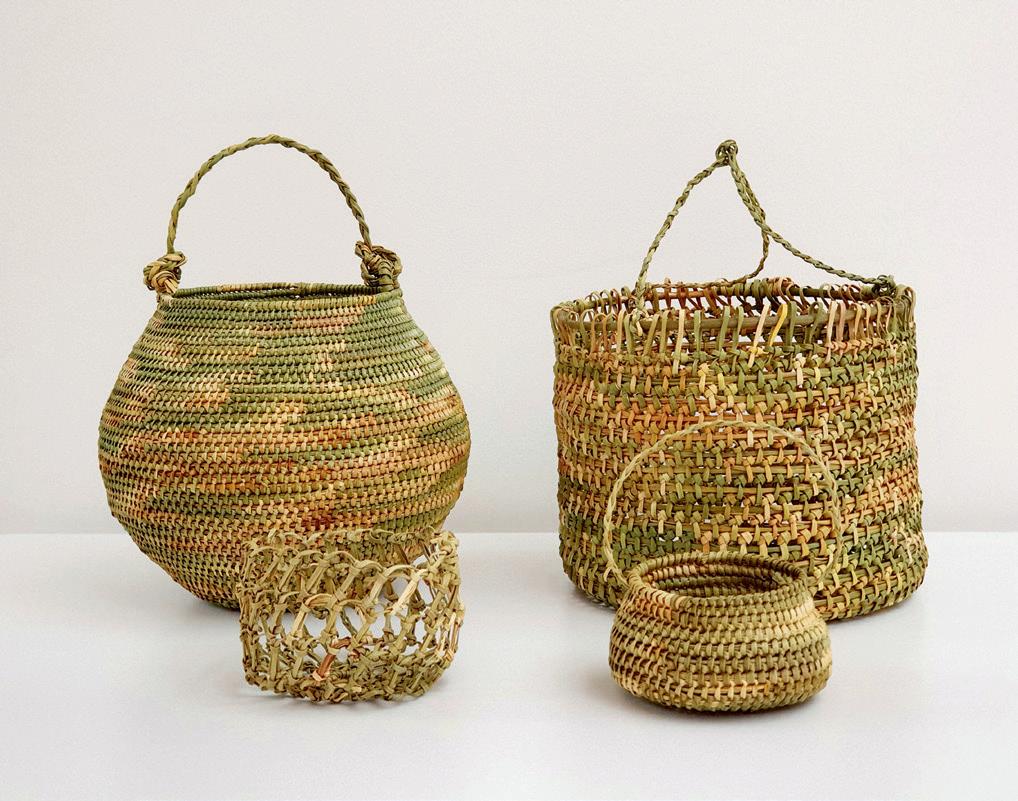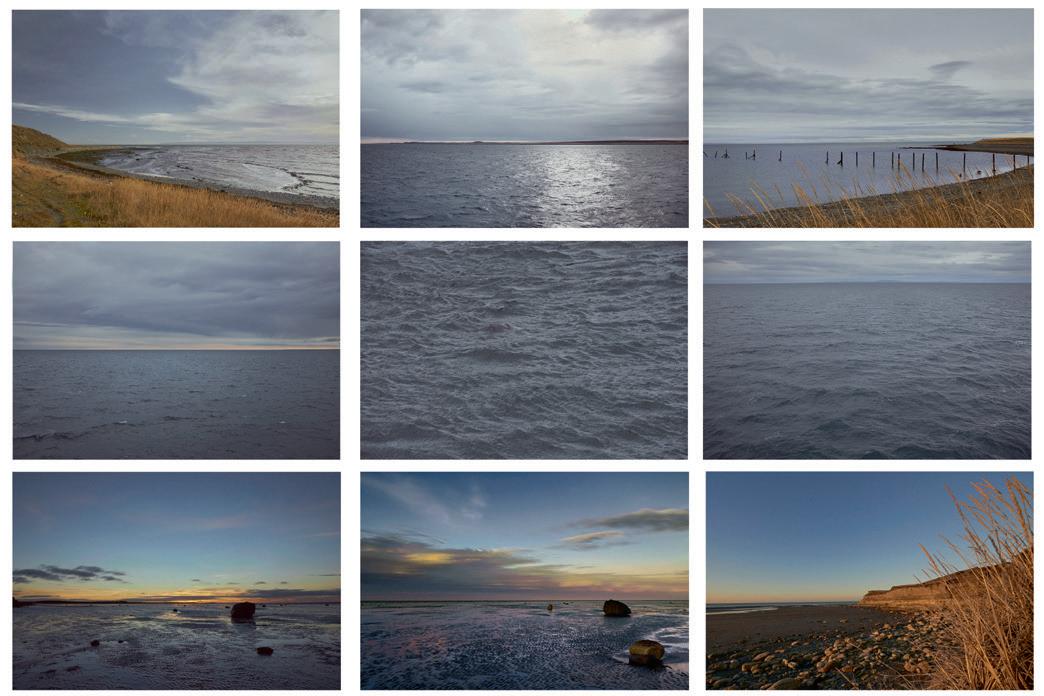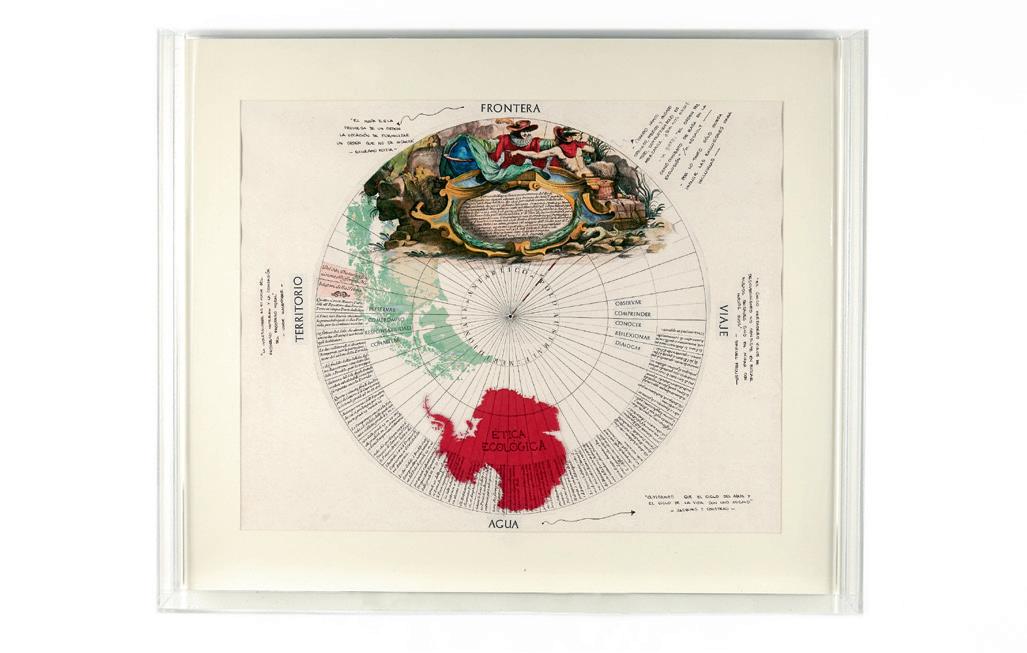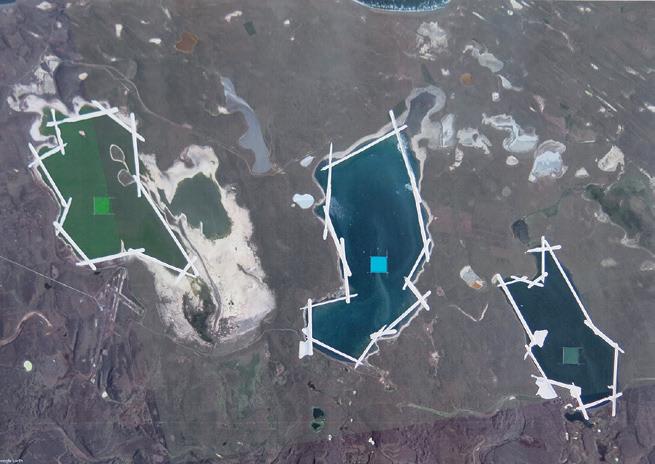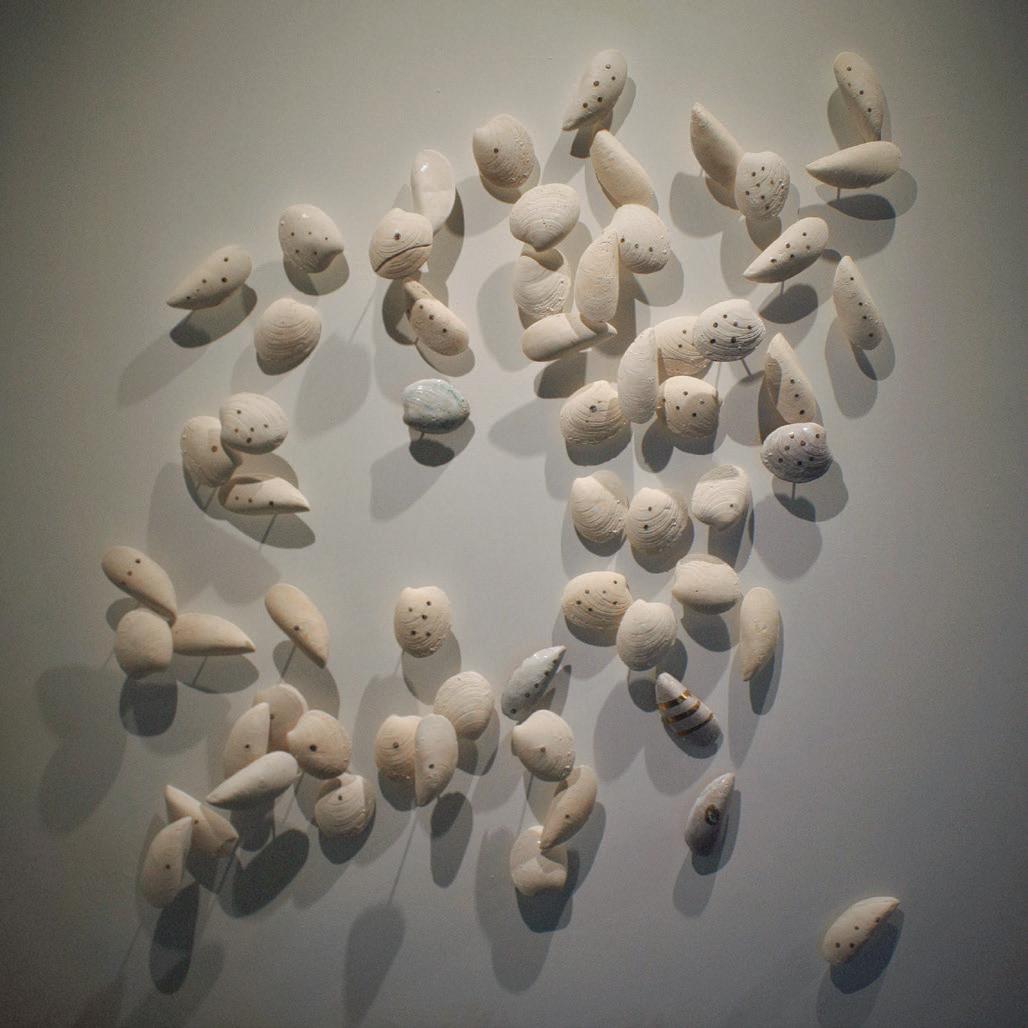
6 minute read
Plataforma Vértices y Tráns-ito. Reflexiones en torno a Magallanes
PLATAFORMA VÉRTICES Y TRÁNS-ITO REFLEXIONES EN TORNO A MAGALLANES
Vértices es una plataforma de investigación y espacio de creación compuesta por artistas, científicos y docentes universitarios, que abordan el territorio geográfico como laboratorio de experimentación interdisciplinaria sobre arte, ciencia, historia, geografía y sociología, desarrollando investigaciones que rompen con la jerarquía de saberes, aprendiendo colectivamente.
Advertisement
Desde Plataforma Vértices creemos en la reflexión y educación común, pensando desde lo local hacia lo global y viceversa. Repensando discursos constituidos con los que trabajar transversalmente, compartimos metodologías, cuestionándolas y experimentando procesos con los que poner en crisis relatos coloniales, políticos y sociales. Así pues, entendemos nuestro espacio como un laboratorio móvil de investigación marítima, terrestre y astronómica, cartografiando e identificando cuestiones que repercuten en nuestras relaciones y pensando nuestras herencias, que deconstruimos desaprendiendo dogmas asimilados.
Nuestros proyectos reflexionan y señalan interacciones políticas, sociales o ambientales y piensan el patrimonio cultural o la sostenibilidad en relación a nuestra contemporaneidad liberal. Mediante seminarios, charlas, residencias para artistas, publicaciones o exposiciones, generamos interacciones con entidades e instituciones de carácter público y privado, trabajando desde el territorio simbólico y transformándonos como sujetos políticos.
Las obras seleccionadas son producto del proyecto “Tráns-ito” realizado en la Región de Magallanes y la Antártica Chilena, en el marco del quinto centenario de la circunnavegación. “Tráns-ito”, posibilita un intercambio de ideas, repensando la transculturización y homogeneización en un territorio donde las conexiones materiales e intangibles de un pasado prehispánico, contribuyen a la identidad individual y colectiva actual. De este modo y en base a la herencia colectiva, queremos señalar la tensión en nuestro pasado colonial y las problemáticas sociales y medioambientales actuales debidas a la imposición y exterminio cultural y social.
“Tráns-ito” ha dado lugar ya a varias exposiciones en Chile y España, aquí se presenta en un nuevo montaje en el que no solo las obras contemporáneas interactúan con las colecciones del museo, sino también se interpretan en su dimensión antropológica, al margen de otras posibles lecturas.
PLATAFORMA VÉRTICES AND TRÁNS-ITO CRITICAL REFLECTIONS ABOUT MAGELLAN STRAITS REGION
Vertices is a research platform and an open space for creation which comprises artists, scientists and university tutors and lecturers, who address the concept of geographical territory, approaching the subject as a laboratory for interdisciplinary experimentation on art, science, history, geography and sociology, developing research that breaks with the hierarchy of knowledge, learning collectively.
At Plataforma Vertices we believe in critical reflection and communal education, pitching our analysis from the local towards the global, and vice versa. Rethinking established discourses in order to study them from a cross-disciplinary perspective, we share methodologies and also subject them to interrogation, experimenting with processes that challenge colonial, political and social narratives. Thus, we see our space as a mobile laboratory for maritime, terrestrial and astronomical research, mapping and identifying issues that affect our relationships, and considering our legacies, which we deconstruct by unlearning assimilated dogmas.
Our projects critically reflect upon, and point towards, political, social or environmental interactions, considering cultural heritage or sustainability in relation to our liberal contemporaneity. Through seminars, talks, artists’ residencies, publications or exhibitions, we generate interactions with public and private organisations and institutions, working from the symbolic realm, and transforming ourselves as political subjects.
The selected works are the result of the “Tráns-ito” project carried out in the Magellan Straits Region and the Chilean Antarctic, as part of the fifth centenary celebrations of the circumnavigation. “Tráns-ito” enables an exchange of ideas, reconsidering transculturation and homogenisation in a territory where material and intangible connections to a preHispanic past contribute to the present-day individual and collective identity. In this way, and by using the collective legacy, we attempt to highlight the tension between our colonial past and current social and environmental problems, which have been caused by cultural and social imposition and extermination.
“Tráns-ito” has already realised several exhibitions in Chile and Spain. Here the project is exhibited in a new presentation, in which not only do contemporary works interact with the museum’s collections, but are also interpreted in all their anthropological scope, apart from other possible readings.
MAGALLANES, UN PASADO DEVASTADO, ¿UN FUTURO ASEGURADO?
El estrecho de Magallanes y los territorios que lo flanquean (Patagonia y Tierra del Fuego, y más allá, la Antártica) constituyen uno de los espacios estratégicos más importantes para el futuro del planeta. Lo es por sus conexiones geográficas: uno de los dos pasos marítimos –junto al Canal de Panamá– entre el Atlántico y el Pacífico y el “puente” natural hacia el continente helado. Pero también por su valor ecológico: se trata de una de las regiones con mayor reserva de agua dulce del planeta, y su fondo marino produce un efecto regulador térmico a través de sus corrientes al transferir agua fría al resto del planeta, ejerciendo un efecto moderador en territorios más calurosos y ayudando a mantener un indispensable equilibrio ante el calentamiento global. También está formado por grandes extensiones de terreno aún no totalmente explotadas y cuenta con recursos pesqueros aún no al borde del agotamiento.
Y, sin embargo, si estas reservas no se protegen ahora, llegará el día en que la avidez de la sociedad global, en aras de un “progreso ilimitado”, acabe con ellas también. Como ya lo ha hecho, en el pasado, con las poblaciones originales de estos territorios, formadas por grupos reducidos y adaptados a este entorno, con el que habían firmado un “contrato biológico”. Aún estamos a tiempo de (re)conocerlas, escucharlas y aprender de ellas cómo mantener el equilibrio con los ecosistemas de este espacio singular y cómo actuar según una nueva ética del patrimonio ecológico común que extienda a regiones adyacentes el Tratado Antártico.
El futuro del planeta también se juega en estos espacios “limítrofes”. ¿Seremos capaces de actuar con la sabiduría de K’aus y la perseverancia de Táiyin?
MAGALLANES, A DEVASTATED PAST, A SECURE FUTURE?
The Strait of Magellan and the territories that flank it (Patagonia and Tierra del Fuego, and beyond, Antarctica) constitute one of the most important strategic spaces for the future of the planet. It is because of its geographical connections: one of the two maritime passages –along with the Panama Canal– between the Atlantic and the Pacific and the natural “bridge” to the frozen continent. But also because of its ecological value: it is one of the regions with the largest reserves of fresh water on the planet, and its seabed produces a thermal regulating effect through its currents by transferring cold water to the rest of the planet, exerting a moderating effect in hotter territories and helping to maintain an essential balance against global warming. It is also made up of large tracts of land not yet fully exploited and has fishery resources not yet on the brink of depletion.
And yet, if these reserves are not protected now, the day will come when the greed of global society, for the sake of “unlimited progress”, will end them too. As it has already done, in the past, with the original populations of these territories, made up of small groups and adapted to this environment, with which they had signed a “biological contract”. We still have time to (re)know them, listen to them and learn from them how to maintain balance with the ecosystems of this unique space and how to act according to a new ethic of the common ecological heritage that extends the Antarctic Treaty to adjacent regions.
The future of the planet is also at stake in these “bordering” spaces. Will we be able to act with the wisdom of K’aus and the perseverance of Táiyin?


